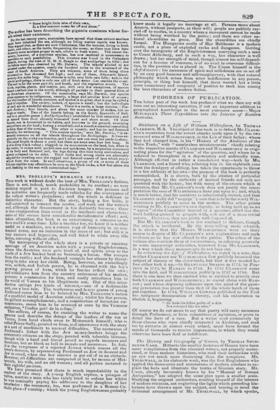Strictures on a Life ff William Wilberforce, by THOMAS CLARKSON,
M.A. The object of this book is to defend Mr.CsAusts SON'S reputation from the covert attacks made upon it by the two reverend sons of WILBFRFORCR, in the Lire of their father; where they bad charged him, in his " History of the Abolition of the Slave Trade," with " numberless misstatements" chiefly relating to the respective merits of CLARKSON and WILBERFORCE in origi- nating plans for the " agitation" of the question, and where he is referred to throughout in a depreciatory and unfriendly tone. Although effseted in rather a roundabout way—both by Mr. CLARKSON, and a friend who, relieving him in his eightieth year from the drudgery of editing, has taken the opportunity to throw in a few addenda of his own—the purpose of the book is perfectly accomplished. It is shown, both by the citation of particular passages, and by the authority of mutual friends not only ac- quainted with the history, but with many of the events which it narrates, that Mr. CLARKSON'S work does not justify the inter- pretation the sons of WILBERFORCE have put upoa it ; and, which is much better, that his narrative is substantially correct, and that CLARKSON really did' engage" (-nice that is to be the worth) WIL- BERFORCS publicly to move in the matter. The other points relating to Mr. CLARKSON'S own dignity, in being held up as an " agent " of the Committee instead ot a member, afford less dis- tinct holding-ground to grapple with, and are of a more trivial nature. However, they are pretty well ilisposed of.
But Mr. Ccitticsox's book is not confined to defence, though the attack is incidental. By the story-telling mode adopted, it is shown that the Messrs. IVILBERFORCE went oil their course in despite of Mr. CLARKSON'S own explanations and such evidence as he has now offered to the public. The editor of the volume also convicts them of incorrectness, in referring generally to some manuscript authorities, borrowed from Mr. CLARKSON, in a way which those manuscripts do not bear out.
In reviewing the Life if 11-ilbeVorce, we stated in a note, that neither CLARKSON IIOF W I LBERFURCE first publicly broached the subject of slavery or the slave-trade, but that it was mooted b1- fore either took it up,—by GRANV iLLE SHARPE in 1772, by Pox- TEUS in 1783, by RAmsar hi 1784. In 1783 CsAtticso:s came into the field, and W ILBERFORCE publicly in 1787 or 1788. But there is one man we then omitted who is entitled to priority over both CLARKSON and WILBERFORCE ; to coeval claim with RAM- SAY; and u hose disposing influence upon the mind of the grow- ing generation was greater than tlrit of the whole batch of them Put together. In 1784, AV ILL! AM COWPER published in the Task his in'ilignant denunciation of slavery, and his exhortation ta abolish it, beginning " Ile finds his fellow guilty of a skin Not coloured like his own."
Of course we do not mean to say that poetry will carry measures through Parliament, or form committees of agitation, or prove in detail the facts of a case. But a writer read extensively by those classes who were chiefly interested in Abolition, and read too by extracts in almost every school, must have formed the minds of Monson& to receive impressions, to which they would otherwise have been deaf or indifferent.


























 Previous page
Previous page